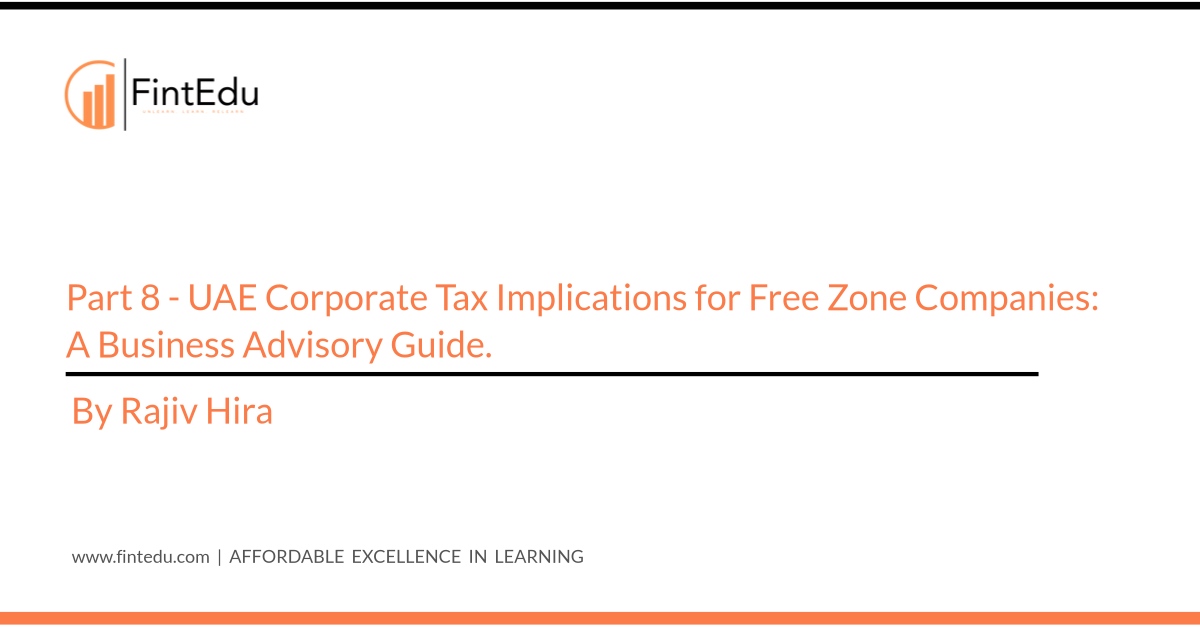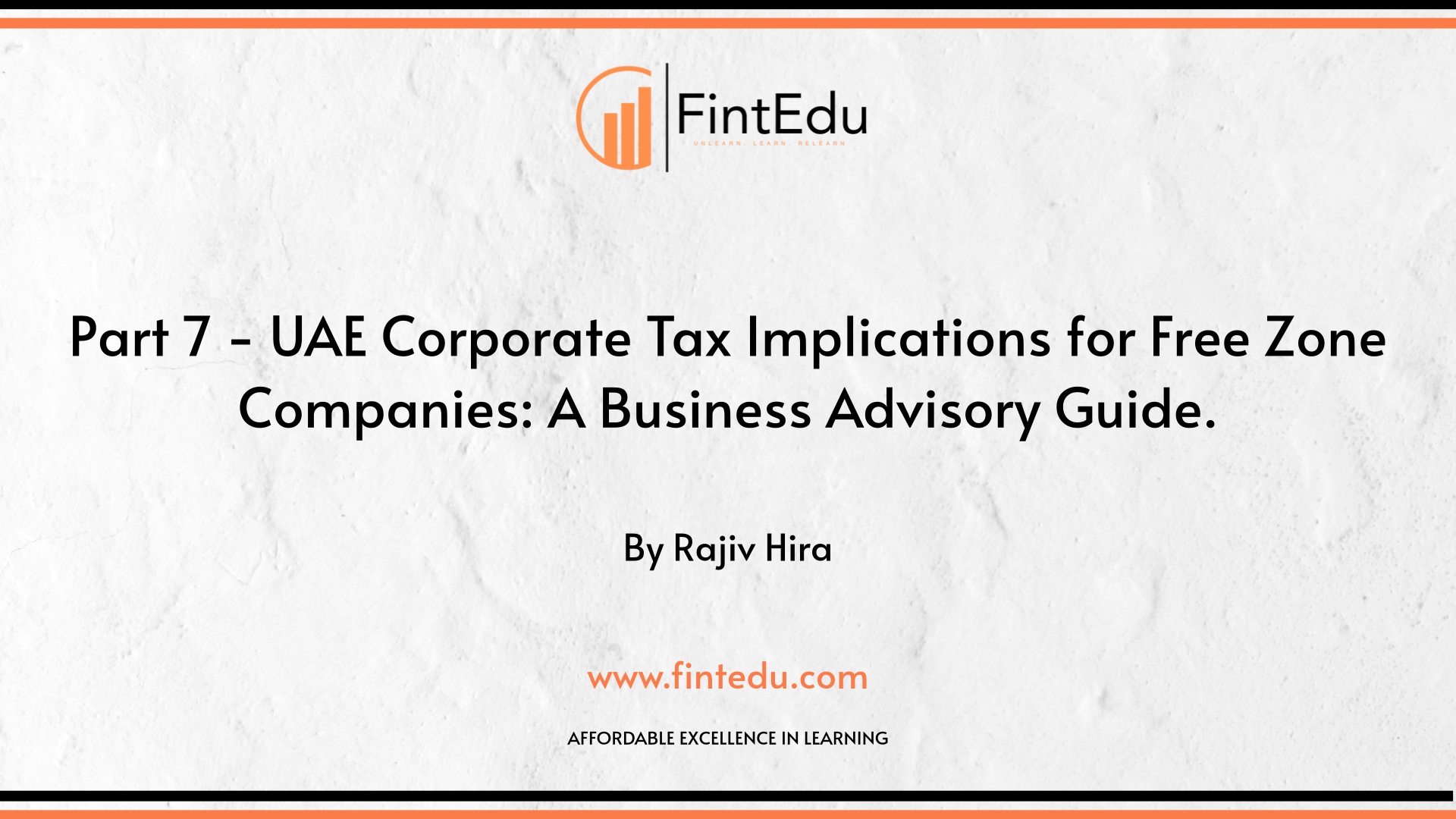LISTEN TO THIS ARTICLE
Holding Companies and Headquarters
Nature of Business: Holding companies and regional headquarters often choose Free Zones for the flexibility and tax advantages. These entities typically hold shares of subsidiaries (local or international), manage group assets, provide strategic oversight, and sometimes offer centralized services (treasury, marketing, IT, etc.) to the group.
Corporate Tax Nuances: The Free Zone regime explicitly accommodates holding and headquarter activities:
Pure Holding Companies: “Holding of shares and other securities for investment purposes” is a Qualifying Activity. This means a Free Zone company that only holds equity investments (and perhaps earns dividends, capital gains, and investment income) can be a QFZP. Many Free Zones (like ADGM, DIFC, JAFZA Offshore or RAK ICC) host holding companies for foreign investors. Under corporate tax, such a company’s dividend income from subsidiaries would often be exempt under general rules anyway (especially if from UAE or from foreign with >5% ownership and a 12-month hold, as per participation exemption), so being QFZP reinforces that it remains untaxed. Capital gains from disposing of subsidiaries (held >12 months) would also likely fall under participation exemption or at least qualify as 0% since the activity is holding for investment (the 12-month rule is built into the definition of holding for “investment purposes”). One thing to watch: if the holding company earns interest or other income (say it gives loans), that drifts into financing; if it’s to related parties, it could be treasury (allowed), but if to third parties, it’s excluded. So holding companies should confine financing activities to within the group to stay in the qualifying ambit.
Headquarter and Intra-Group Services: “Headquarter services to Related Parties” is a Qualifying Activity. This includes providing management, support, and oversight to group companies. Many multinational enterprises set up regional HQs in Dubai or Abu Dhabi Free Zones. The new rules allow those HQ entities to charge fees to subsidiaries (for management services, consulting, etc.) and treat that income as qualifying (0% tax), as long as those services are to related parties and are part of a genuine HQ function. If an HQ also provided services to third-party clients, income from those clients would not be qualifying (because HQ services are only qualifying when to related parties by definition).
Similarly, “Treasury and financing services to Related Parties” as noted is qualifying. So a group finance vehicle in a Free Zone that makes inter-company loans, cash pooling, etc., can earn interest from subsidiaries at 0% tax. This is a powerful incentive for multinationals to centralize treasury operations in the UAE. They must ensure they don’t start lending outside the group or doing non-group financial trades, as that could become excluded revenue.
Property Holding: If a holding company holds real estate investments, caution is needed. Owning real estate that is outside a Free Zone or dealing with real estate to non-Free Zone parties is an excluded activity as mentioned. So a Free Zone holdco owning, say, a warehouse in mainland Dubai that it leases out to someone, would have non-qualifying rental income. Many holding companies avoid holding UAE real estate in a Free Zone entity for this reason, they might use an onshore entity for property to be able to tax it normally (or if it’s an individual’s investment, keep it personal). If the holdco owns commercial property within the Free Zone and leases to a Free Zone tenant, that is allowed as it’s carved out (not excluded).
A large corporate holding (like a global conglomerate’s Middle East holding company) will similarly need substance, which often they do by having a regional HQ office with senior staff. They will also use the Free Zone company to provide some shared services. For example, the holdco might also be the regional management company, charging each subsidiary a management fee. Those fees are related-party HQ services, qualifying for 0%. From a tax planning perspective, they might set those fees to effectively shift some taxable profit from high-tax jurisdictions into the UAE holdco, but they must be arm’s length, since if they overcharge beyond an arm’s-length fee, foreign tax authorities might deny deductions or UAE might adjust it. Transfer pricing is thus important even for internal service fees.
Multiple Holdings and Consolidation: A group with multiple Free Zone holding companies might consider simplifying because each entity will file separately (consolidated tax grouping is not allowed if any member is a QFZP). They cannot form a tax group including a QFZP and a mainland entity, which is a deliberate exclusion in the law. So, large groups will run separate returns for the Free Zone entities and cannot offset losses of start-up ventures in Free Zones against profits of other entities, for example.
Real-World Scenario: Example: Delta Holdings ADGM Ltd is a holding company for a multinational’s Middle East subsidiaries. It receives dividends from each subsidiary and occasionally interest on loans it gave to them. Under CT, Delta qualifies as a QFZP since holding shares is a qualifying activity and the interest is from related-party financing (also qualifying). Delta has a small office in ADGM with a few executives who oversee the regional ops, it is satisfying substance. All its income (dividends, interest, management fee charges) is qualifying and it pays 0% tax. Now, if Delta were to also directly undertake a new business, say it started selling consultancy services to external clients in the region, that external income would be non-qualifying (not a related-party HQ service). If significant, this could spoil its status. They would be advised to set up a separate consultancy subsidiary for third-party work and keep Delta Holdings purely as a group service vehicle. A family office holding company might similarly segregate any active businesses from the holding entity to ensure the holdco stays clean for 0% tax.
In summary, Free Zone holding and HQ companies stand to continue enjoying no tax, but they must focus on group-related activities and passive investments only. They should avoid mixing in active unrelated business. With careful structuring, a Free Zone holdco can centralize profits (via dividends and service fees) from various jurisdictions and utilize the UAE’s 0% environment effectively, as long as anti-abuse, including economic substance and transfer pricing requirements are met.Disclaimer: Content posted is for informational and knowledge sharing purposes only, and is not intended to be a substitute for professional advice related to tax, finance or accounting. The view/interpretation of the publisher is based on the available Law, guidelines and information. Each reader should take due professional care before you act after reading the contents of that article/post. No warranty whatsoever is made that any of the articles are accurate and is not intended to provide, and should not be relied on for tax or accounting advice.
Related Articles
Part 1 - UAE Corporate Tax Implications for Free Zone Companies: A Business Advisory Guide
Part 2 - UAE Corporate Tax Implications for Free Zone Companies: A Business Advisory GuidePart 3 - UAE Corporate Tax Implications for Free Zone Companies: A Business Advisory Guide
Part 4 - UAE Corporate Tax Implications for Free Zone Companies: A Business Advisory Guide
Part 5 - UAE Corporate Tax Implications for Free Zone Companies: A Business Advisory Guide.
Part 6 - UAE Corporate Tax Implications for Free Zone Companies: A Business Advisory Guide.
Part 7 - UAE Corporate Tax Implications for Free Zone Companies: A Business Advisory Guide.
Part 8 - UAE Corporate Tax Implications for Free Zone Companies: A Business Advisory Guide.
Contributor
Related Posts

@@PLUGINFILE@@/Part%208%20-%20UAE%20Corporate%20Tax%20Implications%20for%20Free%20Zone%20Compa...
Read More
@@PLUGINFILE@@/As%20we%20approach%2031%20March%202025%2C%20businesses%20with%20a%20VAT%20year%...
Read More
@@PLUGINFILE@@/Part%207%20-%20UAE%20Corporate%20Tax%20Implications%20for%20Free%20Zone%20Compa...
Read More